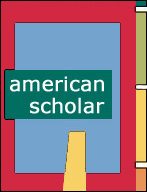English 5571 - American Transcendentalism
Here are some notes I quickly blasted into my word processor. At this point I was still pretty clueless as to how to write a graduate-level research paper.
Journal For Final Paper
1. PreliminariesFor my final paper, I have chosen to define Emersonian idealism, and explore how Hawthorne tested it in his "The Artist and the Beautiful." I have read Emerson's American Scholar twice and have read "The Artist of the Beautiful" once. I plan to re-read it this week.
I was not sure what Dr. H-- expected of me at first, so I visited with him briefly on the subject. He told me that since I enjoyed reading Hawthorne above all other authors this semester, that I should find some connection between his writing and Emerson's philosophy. I was also unclear on the process of finding resources to use in my paper, as this is my first "real" graduate paper. He referred me to the MLA Bibliography Online. This will hopefully be a helpful tool. I used it this morning. I used the ILL to request certain books that I thought might help me. I also went to the library today, and checked out three books, and one bound quarterly journal. This one will be due in a week so I plan to copy the pages I will need.
I hope that as I read, my final thesis will become more solid. At this point I start with this: Hawthorne tests Emerson's idealism in his short story, "The Artist of the Beautiful," and discovers that the philosophy set forth by Emerson leads ultimately to self-satisfaction.
2. Gathering DataAdams, Ephraim Douglas, Ph.D. The Power of Ideals in American History. New York: Kennikat Press, 1969.
Buell, Lawrence. Literary Transcendentalism: Style and Vision in the American Renaissance. London: Cornell University Press, 1973.
Emerson, Ralph Waldo. Ralph Waldo Emerson and Margaret Fuller. Ed. John Carlos Rowe. Boston: Houghton Mifflin Company, 2003.
Hawthorne, Nathaniel. Young Goodman Brown and Other Short Stories. New York: Dover Publications, Inc., 1992.
Marr, David. American Worlds Since Emerson. Amherst: The University of Massachusetts Press, 1988.
Matthiessen, F.O. American Renaissance: Art and Expression. London: Oxford University Press, 1954.
Miller, Perry. The Life of the Mind in America: From the Revolution to the Civil War. New York: Harcourt, Brace & World, Inc., 1965.
Payne, Leonidas Warren, Jr. History of American Literature. New York: Rand, McNally & Company, 1919.
Rowe, John Carlos, ed. Ralph Waldo Emerson and Margaret Fuller. Boston: Houghton Mifflin Company, 2003.
Schmitt, Peter J. Back to Nature: The Arcadian Myth in Urban America. New York: Oxford University Press, 1969.
Shulman, Robert. Social Criticism and Nineteenth-Century American Fictions. Columbia: University of Missouri Press, 1987.
Spiller, Robert E. The Cycle of American Literature: An Essay in Historical Criticism. New York: The Macmillan Company, 1955.
Weinstein, Arnold. "Ralph Waldo Emerson's Yesterday: America's Coming of Age." Classics of American Literature. Compact Disc. The Teaching Company, 1997.
Not sure how to cite these:
Periodical
American Transcendental Quarterly, June 1994. University of Rhode Island. "A Small Heap of Glittering Fragments": Hawthorne's Discontent with the Short Story Form" Kathryn B. McKee
Edited book
Six Classic American Writers ed by Sherman Paul. "Ralph Waldo Emerson" Josephine Miles. Minneapolis: University of Minnesota Press, 1970.
Somehow I used this stuff as a starting point for my paper. My Final is posted on 5571.
